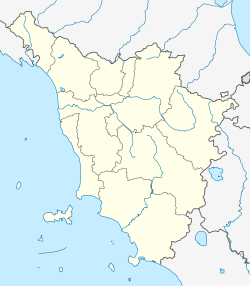This article needs additional citations for verification .(August 2025) |
This article includes a list of general references, but it lacks sufficient corresponding inline citations .(August 2025) |
Pisa Centrale | |||||
|---|---|---|---|---|---|
 Pisa Centrale station building. | |||||
| General information | |||||
| Location | Piazza della Stazione 56125 Pisa | ||||
| Coordinates | 43°42′30″N10°23′54″E / 43.70833°N 10.39833°E | ||||
| Owned by | Rete Ferroviaria Italiana | ||||
| Operated by | Centostazioni | ||||
| Line(s) | Pisa–Livorno–Rome Pisa–La Spezia–Genoa Pisa–Florence Lucca–Pisa Pisa-Collesalvetti-Vada (freight only) | ||||
| Distance | 80.848 km (50.237 mi) from Firenze Santa Maria Novella | ||||
| Platforms | 16 | ||||
| Other information | |||||
| IATA code | PSA | ||||
| |||||
Pisa Centrale railway station (Italian : Stazione di Pisa Centrale) is the central station of the Italian city of Pisa, the first station of the city in terms of passengers, before Pisa San Rossore railway station. The station is one of the major railway junctions of Tuscany. Lines serving the station include three long-distance lines: the Pisa–Livorno–Rome line, the Pisa–La Spezia–Genoa line and the Pisa–Florence line. Local services operate on the Lucca–Pisa line. The line from Pisa to Vada via Collesalvetti, which was closed from 1992 to 2000, is now[ when? ] only open for freight traffic.

